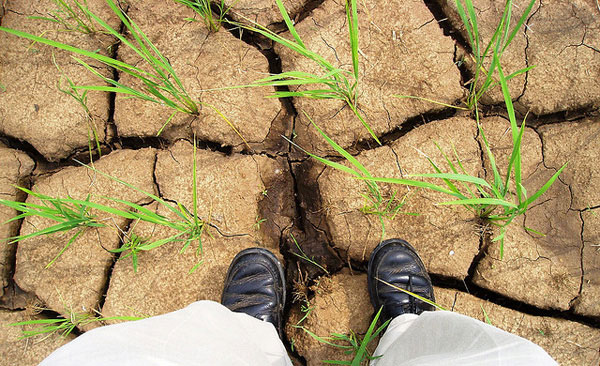As climate change spurs increasingly unpredictable weather—such as droughts and floods—farmers find themselves on the defensive. Unpredictable weather wreaks havoc on both harvests and farmers, particularly smallholder farmers ill-equipped to absorb these weather-related shocks. Because of the inconsistent harvests due to such shocks, farmers are less likely to invest in productivity-enhancing technologies and often remain trapped in a cycle of poor harvests and persistent poverty.
In their discussion paper, Demand for Complementary Financial and Technological Tools for Managing Drought Risk, IFPRI researchers Patrick S. Ward, David Spielman, Neha Kumar, Sumedha Minocha, and colleague David Ortega gauge farmers’ preferences for drought-risk management tools and the manner in which they are marketed and sold in Bangladesh.
The researchers employed choice experiments along with a household survey to pinpoint farmers’ demand for two products: drought-tolerant rice and weather index insurance, sold separately as well as bundled in a package.
The researchers found that, most importantly, farmers view the drought-tolerant rice and weather index insurance as complementary products and, as such, preferred to purchase them bundled. Other key findings highlighted in their paper include:
- Demand for drought-tolerant rice alone was limited, particularly among farmers who had access to irrigation and were not as vulnerable to dry spells.
- Farmers considered insurance to be highly desirable, regardless of its coverage or trigger thresholds.
- When willingness to pay for insurance was assessed, the farmers valued insurance products well above their “actuarial value,” which contrasts with findings from other studies as well as conventional wisdom suggesting that farmers are not interested in insurance and are unwilling to pay a fair market price for it.
- Farmers are more willing to pay for weather index insurance when it is bundled with drought-tolerant rice, as opposed to purchasing the insurance on its own.
The study also identified areas for future research involving drought-tolerant rice. While the farmers surveyed were less interested in the product because they currently have access to irrigation, adopting this rice variety could help reduce overall water usage. This poses important policy implications for rural water pricing in Bangladesh and other countries and regions affected by drought.







